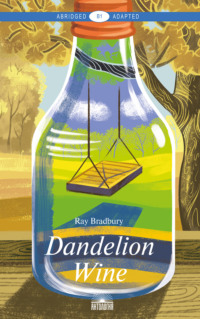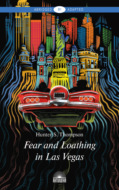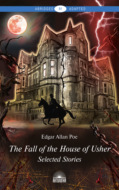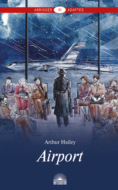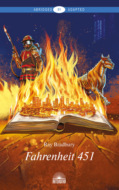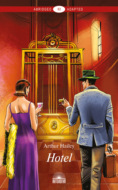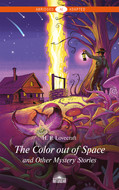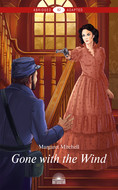Kitabı oku: «Dandelion Wine / Вино из одуванчиков», sayfa 2
Mr. Sanderson’s face darkened. “Oh, ten, twenty, say, thirty years ago. Why..?”
“Mr. Sanderson, don’t you think you owe it to your customers, sir, to at least try the tennis shoes you sell, for just one minute, so you know how they feel? People forget if they don’t keep testing things. United Cigar Store man smokes cigars, doesn’t he? Candy-store man tastes his own stuff, I think. So…”
“You can see,” said the old man, “I’m wearing shoes.”
“But not sneakers, sir! How are you going to sell sneakers if you cannot praise them and how are you going to praise them if you don’t know them?”
“Well…,” said Mr. Sanderson.
“Mr. Sanderson,” said Douglas, “you sell me something and I’ll sell you something just as valuable.”
The old man sighed but agreed to put on a pair of the sneakers.
“How do they feel?” asked the boy when Mr. Sanderson stood up.
“They feel fine.” He started to sit down.
“Please!” Douglas held out his hand. “Mr. Sanderson, now could you kind of rock back and forth a little, bounce kind of, while I tell you the rest? It’s this: I give you my money, you give me the shoes, I owe you a dollar. But, Mr. Sanderson, as soon as I get those shoes on, you know what happens?”
“What?”
“Bang! I deliver your packages, pick up packages, bring you coffee, dump your trash, run to the post office, telegraph office, library! You’ll see me in and out, in and out, every minute. Feel those shoes, Mr. Sanderson, feel how fast they’d take me? Feel all the running inside? Feel how they don’t like you just standing there? Feel how quickly I’ll be doing all those things for you? You stay in the nice cool store while I’m jumping all around town! But it’s not me really, it’s the shoes. They’re going like mad down alleys, cutting corners, and back!”
The flow of the words carried Mr. Sanderson, and he began to sink deep in the shoes, to flex his toes, test his ankles. He rocked softly, secretly, back and forth in a small breeze from the open door. The tennis shoes silently sank themselves deep in the carpet, as in a jungle grass. Emotions ran over his face as if many colored lights had been switched on and off. Slowly he rocked himself to a halt, and the boy stopped talking, and they stood there looking at each other in a wonderful and natural silence.
“Boy,” said the old man at last, “in five years, how would you like a job selling shoes in this Emporium?”
“Gosh, thanks, Mr. Sanderson, but I don’t know what I’m going to be yet.”
“Anything you want to be, son,” said the old man, “you’ll be. No one will ever stop you.”
The old man walked lightly across the store to the wall of shoe boxes, came back with the tennis shoes for the boy, and wrote up a list on some paper while the boy was lacing the shoes on his feet and then standing there, waiting.
The old man gave him his list. “A dozen things you got to do for me this afternoon. Finish them, we’re even, and you’re fired.”
“Thanks, Mr. Sanderson!” Douglas jumped away.
“Stop!” cried the old man.
Douglas stopped and turned.
“How do they feel?” Mr. Sanderson asked.
The boy looked down at his feet deep in the rivers, in the fields of wheat, in the wind that already was rushing him out of the town. He looked up at the old man.His eyes were burning, but no sound came out of his mouth.
“Antelopes?” said the old man, looking from the boy’s face to his shoes. “Gazelles?”
The boy thought about it and nodded a quick nod. Almost immediately he vanished. The door stood empty. The sound of the tennis shoes faded in the jungle heat.
Mr. Sanderson stood in the sun-lit up door, listening. From a long time ago, when he dreamed as a boy, he remembered the sound. Beautiful creatures leaping under the sky, gone through bushes, under trees, away, and only the soft echo of their running left behind.
“Antelopes,” said Mr. Sanderson. “Gazelles.”
He picked up the boy’s winter shoes, left behind, heavy with forgotten rains and long-melted snows. Moving out of the hot sun, walking softly, lightly, slowly, he turned back toward civilization…
Tom’s statistics gave Douglas a fresh idea. He decided to write down all the things they usually did every summer in one part of his yellow nickel notebook, under the title RITES AND CEREMONIES, and in the other part he was going to register things they did for the first time. The title of that part was DISCOVERIES AND REVELATIONS.
“Like eating olives?” Tom asked.
“More important than that. Like finding out maybe that Grandpa and Dad don’t know everything in the world.”
“They know every dam’ thing there is to know, and don’t you forget it!”
“Tom, don’t argue, I’ve already written it down under Discoveries and Revelations. They don’t know everything. But it’s no crime. That I discovered, too.”
“What other new crazy stuff you got in there?”
“I’m alive.”
“Heck, that’s old!”
“Thinking about it, noticing it, is new. You do things and don’t watch. Then all of a sudden you look and see what you’re doing and it’s the first time, really. In other words, you do an old familiar thing, like bottling dandelion wine, and you put that under RITES AND CEREMONIES. And then you think about it, and what you think, crazy or not, you put under DISCOVERIES AND REVELATIONS. Here’s what I got on the wine: Every time you bottle it, you got a whole lump of 1928 put away, safe. How do you like that, Tom?”
“Can’t say I got it at all.”
“Well, here’s another. Under CEREMONIES I got: First argument and licking of Summer 1928 by Dad, morning of June 24th. Under REVELATIONS I got: The reason why grown-ups and kids fight is because they belong to separate races. Look at them, different from us. Look at us, different from them. Separate races, and never the two shall meet.”
“Doug, you hit it, you hit it! That’s right! That’s exactly why we don’t get along with Mom or Dad. Trouble, trouble, from sunrise to supper! Boy, you’re a genius!”
“So, when you see something done over and over, tell me. Think about it, and tell me that.”
“I got a statistic for you right now. Take your pencil, Doug. There are five billion trees in the world. I looked it up. Under every tree is a shadow, right? So, then, what makes night? I’ll tell you: shadows crawling out from under five billion trees! If only we could find a way to keep those dam five billion shadows under those trees, we could stay up half the night, Doug, because there’d be no night! There you are; something old, something new.”
“That’s old and new, all right.” Douglas licked his favorite yellow pencil. “Say it again.”
“Shadows are under five billion trees…”
Summer was full of rituals, each with its natural time and place. The ritual of lemonade or ice-tea making, the ritual of wine, shoes, or no shoes, and at last, the ritual of the front-porch swing.
On the third day of summer in the late afternoon Grandfather came out from the front door and looked at the two empty rings in the ceiling of the porch. He moved to the geranium-pot-lined rail, wet his finger to test the wind, and took off his jacket to see how it felt in shirt sleeves in the evening. He answered the salutes of other captains on yet other flowered porches, out themselves to see if it was warm enough, deaf to their wives chattering behind black porch screens.
“All right, Douglas, let’s set it up.”
They found the swing chair in the garage, dusted it, brought it to the porch, and Grandpa chained it to the porch-ceiling rings. The swing was, in fact, the most important thing for the quiet summer-night festivals.
Douglas, being lighter, was first to sit in the swing. Then, after a moment, Grandfather cautiously settled his pontifical weight beside the boy. Thus they sat, smiling at each other, nodding, as they swung silently back and forth, back and forth.
Ten minutes later Grandma appeared with water buckets and brooms to wash down and sweep off the porch. Other chairs, rockers and straight-backs, were brought from the house.
“Always like to start sitting early in the season,” said Grandpa, “before the mosquitoes thicken.”
About seven o’clock various sounds could be heard from the house: the chairs scraping back from the tables, someone experimenting with a yellow-toothed piano, matches being struck, the first dishes bubbling in the suds and tinkling on the wall racks, somewhere, faintly, a phonograph playing. And then at house after house on the twilight streets, under the huge oaks and elms, on shady porches, people would begin to appear.
Uncle Bert, perhaps Grandfather, then Father, and some of the cousins – the men all would come out first into the warm evening, blowing smoke, leaving the women’s voices behind, in the kitchen, to set their universe in order. Then the first male voices would be heard under the porch roof, their feet up, the boys sat on the worn steps or wooden rails where sometime during the evening something, a boy or a geranium pot, would fall off.
At last, Grandma, Great-grandma, and Mother would appear, and the men would move, and offer seats. The women carried folded newspapers, bamboo whisks, or perfumed kerchiefs, to fan their faces with, as they talked.
Sitting on the summer-night porch was so good, so easy and so reassuring. These were rituals that were right and lasting; the lighting of pipes, the pale hands that moved knitting needles in the dimness, the eating of ice cream, the coming and going of all the people. For at some time or other during the evening, everyone visited here: the neighbors down the street or across the street; Miss Fern and Miss Roberta would drive by in their electric green machine, give Tom or Douglas a ride around the block and then come up and sit down and fan away the fever in their cheeks; or Mr. Jonas, the junkman, would leave his horse and wagon in the alley and come up the steps looking as fresh as if his talk had never been said before, and somehow it never had. And last of all, the children, who had been off playing a last hide-and-seek or kick-the-can, breathing hard, glowing, would sickle quietly back like boomerangs along the soundless lawn, to sink beneath the talking talking talking of the porch voices which would weigh and gentle them down…
Douglas loved to lie there quietly, listening to those voices weaving the dark together. The grown-ups had forgotten he was there, so still, so quietly he lay, noting the plans they were making for his and their own futures. And the voices drifted in moonlit clouds of cigarette smoke while the moths, like late apple-blossoms came alive, tapped lightly about the far street lights, and the voices moved on into the coming years…
In front of the United Cigar Store this evening the men gathered and talked about the destruction that threatened human kind through all modern machines and inventions.Their sepulchral speeches distressed Leo Auffmann, the town jeweler, who, widening his large liquid-dark eyes, at last threw up his childlike hands and cried out in dismay.
“Stop! In God’s name, stop this funereal talk!”
“Lee, how right you are,” said Grandfather Spaulding, passing on his nightly stroll with his grandsons Douglas and Tom. “But, Lee, only you can shut these doom-talkers up. Invent something that will make the future brighter, more comforting and joyful. You’ve invented bicycles, repaired the penny slot-machines in the playing arcade, been our town movie projectionist, haven’t you?”
“Sure,” said Douglas. “Invent us a happiness machine!”
The men laughed.
“Don’t laugh,” said Leo Auffmann. “How have we used machines so far? To make people cry! Yes! Every time man and the machine look like they will get on all right – boom! Someone adds a cog, and airplanes drop bombs on us, cars run us off cliffs. So is the boy wrong to ask? No! No…”
He went to the curb to his bicycle and touched it as if it were an animal.
“What can I lose?” he murmured. “A little skin off my fingers, a few pounds of metal, some sleep? I’ll do it!”
“Lee,” said Grandfather, “we didn’t mean —”
But Leo Auffmann was gone, pedaling off through the warm summer evening, his voice drifting back. “…I’ll do it…”
“You know,” said Tom, in awe, “I bet he will.”
When seeing him riding along the brick streets of evening, you understood that Leo Auffmann enjoyed everything around him: the rustle of the hot grass when the wind blew like a furnace, or the singing of the electric power lines in the wind.
Now, pedaling along, he thought about the shocks of life – what were they? Getting born, growing up, growing old, dying. Not much to do about the first. But – the other three?
In his head now, golden spokes of the spinning wheels of his Happiness Machine sparkled. A machine, now, to help boys grow brave and strong, girls change from an ugly duckling to a white swan. And in the late years of your life, as you lie abed at nights, and your heartbeat is increasing to a billion, his invention must let a man take the autumn of his life easy.
When he arrived home, his six children, Saul, Marshall, Joseph, Rebecca, Ruth, Naomi, all ages from five to fifteen, rushed across the lawn to take his bike. They hugged him all at once.
“We waited. We got ice cream!”
Moving toward the porch, he could feel his wife’s smile there in the dark.
Five minutes the family ate ice cream in comfortable silence, then he said, “Lena? What would you think if I tried to invent a Happiness Machine?”
“Is something wrong?” she asked quickly.
Before Grandfather and the boys could reach home, Charlie Woodman and John Huff and some other boys rushed by like meteors. Their gravity was so huge they pulled Douglas away from Grandfather and Tom and took him off toward the ravine.
“Don’t get lost, son!”
“I won’t… I won’t…”
The boys disappeared into darkness.
Tom and Grandfather walked the rest of the way in silence, except when they turned in at home and Tom said, “boy, a Happiness Machine – wow!”
The courthouse clock struck eight.
The courthouse clock struck nine and it was really night on this small street in a small town in a big state on a large continent on a planet earth hurtling down the pit of space toward nowhere or somewhere, and Tom was feeling every mile of the long drop. He sat by the front-door screen looking out at that rushing blackness that looked very innocent as if it was holding still. Only when you closed your eyes and lay down could you feel the world spinning under your bed.
There was a smell of rain. Mother was ironing and sprinkling water from a corked ketchup bottle over the crackling dry clothes behind Tom.
One store was still open about a block away – Mrs. Singer’s.
Finally, just before it was time for Mrs. Singer to close her store, Mother relented and told Tom to run to Mrs. Singer’s and buy a pint of ice cream.
He took the money and ran barefooted over the warm evening pavement. He crossed the street and found Mrs. Singer moving about her store, singing Yiddish melodies.
“Pint ice cream?” she said. “Chocolate on top? Yes!”
He gave the money, received the chill, icy pack, and rubbing it across his brow and cheek, laughing, rushed homeward. Behind him the lights of the lonely little store went out and there was only a street light on the corner, and the whole city seemed to be going to sleep.
Mother was still ironing when he opened the screen door. She looked hot and irritated but she smiled just the same.
“When will Dad be home from his meeting?” he asked.
“About eleven or eleven-thirty,” Mother said. She took the ice cream to the kitchen and put two portions away, for Douglas and Father when they come.
They sat enjoying the ice cream. The deep quiet summer night was around them, all around their small house on the small street. Mother sat in the armchair by the phonograph, eating her dessert and saying, “It was a hot day. Earth soaks up all the heat and lets it out at night. It’ll be soggy sleeping.”
They both sat listening to the night. The silence was complete because the radio needed a new battery, and they had played all the records on the phonograph to exhaustion. So Tom just sat on the floor and looked out into the darkness, pressing his nose against the screen.
“I wonder where Doug is. It’s almost nine-thirty.”
“He’ll be here,” Tom said, knowing very well that Douglas would be.
Mother went to the kitchen to wash the dishes, and he followed her. Then, silently, they went to the living room, removed the couch cushions and, together, opened it and extended it down into the double bed it secretly was. Mother made the bed, plumping up pillows for their heads. But she stopped him when he started unbuttoning his shirt saying, “Wait awhile, Tom.”
“Why?”
“Because I say so.”
“You look funny, Mom.”
Mom went to the door and called, “Douglas, Douglas, oh Doug! Douglasssssss!” over and over. There was no answer. She stepped out into the night, walked under the lilac bush, and called again.
Silence.
She called twice more. Tom sat in the room. Any moment now, Douglas would answer from down the long narrow street, “All right, Mom! All right, Mother! Hey!”
But he didn’t answer. Mother came back and said, “Come on, Tom. We’ll take a walk.”
“Where to?”
“Just down the block. Come on.”
They walked down the dark street. The crickets were sounding louder against the darkening dark. They reached a corner, turned, and walked toward the West Ravine.
There was such a complete lack of life, light, and activity. Here and there, in the distance, dim squares of light glowed where people were still up. But most of the houses, darkened, were sleeping already, and there were a few darkhouses where the occupants still sat talking low night talk on their front porches.
“I wish your father was home,” said Mother. Her large hand squeezed around his small one. “Just wait till I get that boy. The Lonely One’s around again. Killing people. No one’s safe anymore. You never know when the Lonely One’ll turn up or where. So help me, when Doug gets home I’ll give him a sound thrashing.”
Now they had walked another block and were standing by the black silhouette of the German Baptist Church. In back of the church, a hundred yards away, the ravine began. He could smell it. It had a dark-sewer, rotten-foliage odor. The wide ravine cut and twisted across town – a jungle by day, a place to let alone at night, Mother often declared.
He was only ten years old. He knew little of death, fear, or dread. Death was the waxen figure in the coffin when he was six and Great-grandfather died, silent, withdrawn, no more to tell him how to be a good boy, no more to comment briefly on politics. Death was his little sister one morning when he awoke at the age of seven, looked into her crib, and saw her staring up at him with a blind, blue, fixed and frozen stare until the men came with a small wicker basket to take her away. Death was when he stood by her high chair four weeks later and suddenly understood that she’d never be in it again, laughing and crying and making him jealous of her because she was born. That was death. And Death was the Lonely One, unseen, walking and standing behind trees, coming from the country, once or twice a year, to this town, to these streets, to these many places where there was little light, to kill one, two, three women in the past three years. That was Death…
But this was more than Death. This dark, dark summer night was all things you would ever feel or see or hear in your life, drowning you all at once.
They walked along a weed-fringed path while the crickets’ chorus rose in a loud full drumming. He followed obediently behind brave, fine, tall Mother – defender of the universe. Together, they reached and paused at the very end of civilization.
The Ravine.
Here and now, down in that pit of black jungle were suddenly all the things he would never know or understand; all the things without names lived in the deep tree shadow, in the odor of decay.
He and his mother were alone.
Her hand trembled. He realized his mother was frightened. It was a shock for him. So, she, too, felt that nameless threat from that darkness, that malignancy down below. Was there, then, no strength in growing up? No consolation in being an adult? No worldly citadel strong enough to stand up to the dreadful attack of midnights? Doubts flooded him. He was suddenly cold as a wind out of December.
He realized that all men were like this; that each person was to himself one alone. A unit in a society, but always afraid. Like here, standing. If he should scream for help, would it matter?
Blackness could come and swallow quickly; in one freezing moment all would be finished. Long before dawn, long before police with flashlights might come, long before worried men could rustle down the pebbles to his help. Even if they were within five hundred yards of him now, and help certainly was, in three seconds a dark wave could rise to take all ten years from him and —
The shock of life’s loneliness crushed his beginning-to- tremble body. Mother was alone, too. She could not look to the sanctity of marriage, the protection of her family’s love, she could not look to the United States Constitution or the City Police, she could not look anywhere, in this very moment, except into her heart, and there she would only find uncontrollable disgust and fear. In this moment it was an individual problem looking for an individual solution. He must accept being alone and work on from there.
He clung to his mother. Oh, Lord, don’t let her die, please, he thought. Don’t do anything to us. Father will be coming home from his meeting in an hour and if the house is empty —
Mother went down the path into the primeval jungle. His voice trembled. “Mom, Doug’s all right. He’s all right!”
Mother’s voice was strained, high. “He always comes through here. I tell him not to, but those kids, they come through here anyway. Some night he’ll come through and never come out again —”
Never come out again. That could mean death!
Alone in the universe.
There were a million small towns like this all over the world, with no lights, but many shadows. Oh, the vast loneliness of them. The secret damp ravines of them. Life was a horror lived in them at night, when at all sides sanity, marriage, children, happiness, were threatened by an ogre called Death.
Mother raised her voice into the dark. “Doug! Douglas!”
Suddenly both of them felt something was wrong.
The crickets’ chorus had stopped. Silence was absolutely complete.
Why should the crickets stop? Why? What reason? They’d never stopped before. Not ever.
Something was going to happen.
The silence was growing, growing; the tenseness was growing, growing. Oh, it was so dark, so far away from everything!
And then, a way off across the ravine:
“Okay, Mom! Coming, Mother!”
And again: “Hi, Mom! Coming, Mom!”
And then the sound of tennis shoes running down through the pit of the ravine as three kids came racing, giggling. His brother Douglas, Chuck Woodman, and John Huff.
The crickets sang!
The darkness pulled back, frightened, shocked, furious. Pulled back, losing its appetite at being so rudely interrupted as it prepared to feed. As the dark retreated like a wave on the shore, three children ran out of it, laughing.
“Hi, Mom! Hi, Tom! Hey!”
“Young man, you’re going to get a thrashing,” declared Mother. She put away her fear instantly. Tom knew she would never tell anyone of it. It would be in her heart, though, for all time, as it was in his heart for all time.
They walked home to bed in the late summer night. He was glad Douglas was alive. Very glad.
“Only two things I know for sure, Doug,” Tom whispered, lying in bed beside Douglas.
“What?”
“Nighttime is awfully dark – is one.”
“What’s the other?”
“The ravine at night doesn’t belong in Mr. Auffmann’s Happiness Machine, if he ever builds it.”
Late at night on the front porch Leo Auffmann wrote a list of components for his Happiness Machine. His wife joined him and sat down next to him on the swing. Theirs was a very happy family.
“That machine,” she said, “…we don’t need it.”
“No,” he said, “but sometimes you have to build for others. I’ve been thinking what to put in. Motion pictures? Radios? Stereoscopic viewers? All those in one place so any man can run his hand over it and smile and say, ‘Yes, sir, that’s happiness’.”
Yes, he thought, to make a mechanism that in spite of wet feet, various troubles, rumpled beds, and those three-in-the-morning hours when monsters ate your soul, would manufacture happiness, like that magic salt mill that, thrown in the ocean, made salt forever and turned the sea to brine. Who wouldn’t put all his soul into inventing a machine like that? he asked the world, he asked the town, he asked his wife!
In the porch swing beside him, Lena’s uneasy silence was an opinion.
Silent now, too, head back, he listened to the elm leaves above rustling in the wind.
Don’t forget, he told himself, that sound, too, must be in the machine.
Grandfather smiled in his sleep.
He awoke and lay quietly listening, and the smile was explained: he heard a sound which was far more important than birds, or the rustle of new leaves. This sound meant that summer had officially begun. A cool soft fountain of sweet summer grass leaped up from the chattering mower. Grandfather imagined it tickling his legs, spraying his warm face, filling his nostrils with the timeless scent of a new season begun, with the promise that, yes, we’ll all live another twelve months.
God bless the lawn-mower, he thought. What fool made January first New Year’s Day? No, they should set a man to watch the grasses across a million Illinois, Ohio, and Iowa lawns, and on that morning when it was long enough for cutting, instead of rockets and hymns and yelling, there should be a great symphony of lawn-mowers reaping fresh grass upon the prairie lands. Instead of confetti and serpentine, people should throw grass spray at each other on the one day each year that really represents Beginning!
He went to the window and looked out into the sunshine, and sure enough, there was a boarder, a young newspaperman named Forrester, just finishing a row.
“Morning, Mr. Spaulding!”
“Give ’em hell, Bill!” cried Grandpa heartily, and went downstairs to eat Grandma’s breakfast, with the window open so the buzz of the lawn-mower accompanied his eating.
“It gives you confidence,” Grandpa said. “That lawnmower. Listen to it!”
“Won’t be using the lawn-mower much longer,” Grandma said. “Bill Forrester’s putting in a new kind of grass that never needs cutting.”
Grandpa stared at the woman. “You’re finding a poor way to joke with me.”
“Go look for yourself,” said Grandma, “it was Bill Forrester’s idea. The new grass is waiting in little trays by the side of the house. You just dig small holes here and there and put the new grass in spots. By the end of the year the new grass kills off the old, and you sell your lawn-mower.”
Grandpa was up from his chair, through the hall, and out the front door in ten seconds.
“That’s right,” Bill Forrester said. “Bought the grass yesterday. Thought, while I’m on vacation I’d just plant it for you.”
“Why wasn’t I consulted about this? It’s my lawn!” cried Grandfather.
“Thought you’d appreciate it, Mr. Spaulding.”
“Well, I don’t think I do appreciate it.”
Grandpa looked at the new grass suspiciously. “Looks like plain old grass to me. You sure some horse trader didn’t catch you early in the morning when you weren’t fully awake?”
“I’ve seen the stuff growing in California. Only so high and no higher. If it survives our climate, next year we won’t have to cut it once a week.”
“That’s the trouble with your generation,” said Grandpa. “Bill, I’m ashamed ofyou, you a newspaperman. All the things in life that were put here to savor, you eliminate. Save time, save work, you say.” He nudged the grass trays disrespectfully. “Bill, when you’re my age, you’ll find out it’s the little savors and little things that count more than big ones. A walk on a spring morning is better than an eighty-mile ride in a car, you know why? Because it’s full of flavors, full of a lot of things growing. You’ve time to seek and find. I know – you’re after the bigjobs now, and I suppose that’s fit and proper. But for a young man working on a newspaper, you got to look for grapes as well as watermelons. If you had your way you’d pass a law to abolish all the little jobs, the little things. But then you’d leave yourselves nothing to do between the big jobs and you’d have a devil of a time thinking up things to do so you wouldn’t go crazy. Instead of that, why not let nature show you a few things? Cutting grass and pulling weeds can be a way of life, son.”
Bill Forrester was smiling quietly at him.
“I know,” said Grandpa, “I talk too much.”
“There’s no one I’d rather hear.”
“Lecture continued, then. Lilacs on a bush are better than orchids. And dandelions are better! Why? Because they bend you over and turn you away from all the people and the town for a little while and get you down where you remember you got a nose again. And when you’re all to yourself that way, you’re really yourself for a little while; you get to thinking things through, alone. Gardening is a very helpful excuse for being a philosopher. Nobody guesses, nobody accuses, nobody knows, but there you are, Plato in the peonies, Socrates force-growing his own hemlock. A man carrying a sack of manure across his lawn is kin to Atlas letting the world spin easy on his shoulder. As Samuel Spaulding, Esquire, once said, ‘Dig in the earth, look into the soul.’ Spin those mower blades, Bill, and walk in the spray of the Fountain of Youth. End of lecture.”
“About this grass now. I didn’t finish telling,” said Bill. “It grows so close it’s sure to kill off clover and dandelions —”
“Great God in heaven! That means no dandelion wine next year! That means no bees crossing our lawn! You’re out of your mind, son! Look here, how much did all this cost you?”
“A dollar a tray. I bought ten trays as a surprise.”
Grandpa took his old purse from his pocket and removed from it three five-dollar bills. “Bill, you’ve just made a great profit of five dollars on this deal. I want you to deliver this unromantic grass into the ravine, the garbage dump – anywhere – but I ask you in a civil and humble voice not to plant it in my yard. Your motives are above reproach, but my motives, I feel, because I’m approaching my tenderest years, must be considered first.”
Ücretsiz ön izlemeyi tamamladınız.
